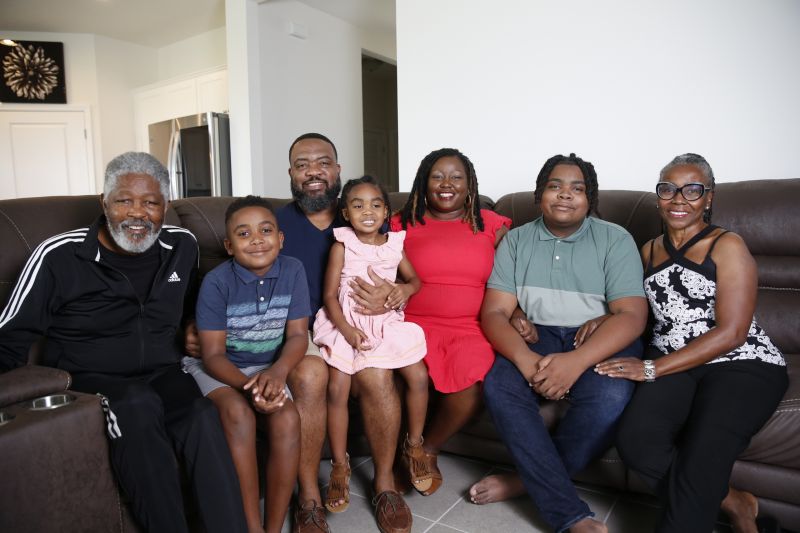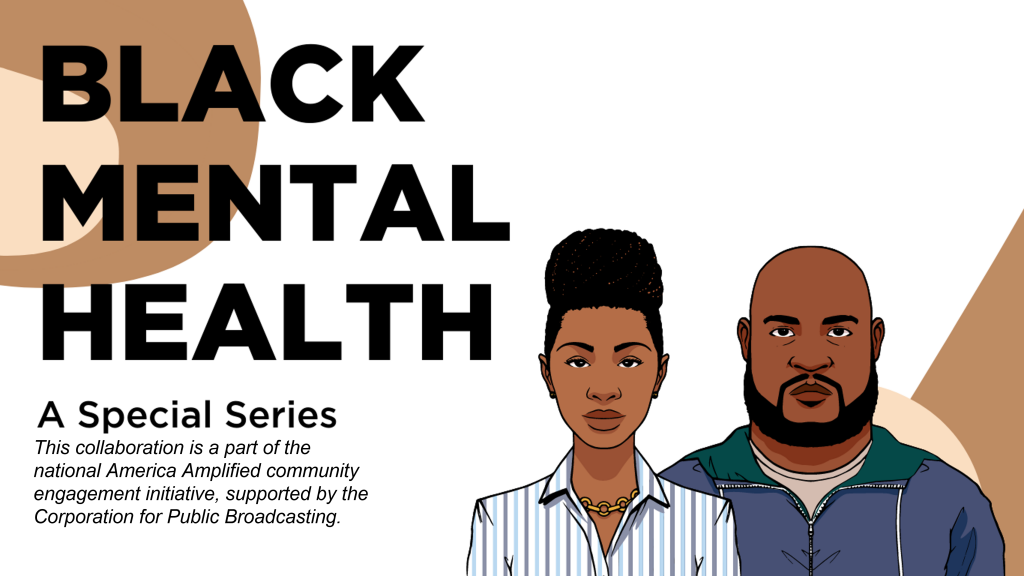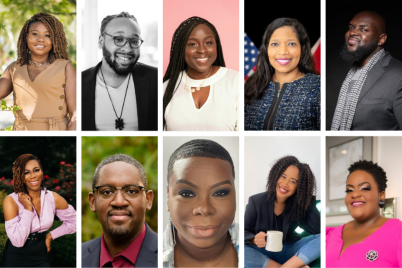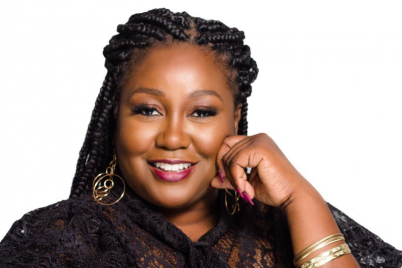Nathan Williams II and his wife, Kiva Williams, and their children – Noah, Nia and Nathan III – pose for a portrait in their Tampa home on July 9. With them are Kiva’s parents, Willie Connor (far left) and Vivian Connor (far right). OCTAVIO JONES/ WUSF PUBLIC MEDIA
BY STEPHANIE CLAYTOR, Florida Courier
Editor’s note: This story is part of a local journalism collaboration about the impacts of mental health on Black Floridians and how they are facing a variety of challenges.
With women leaving the workforce in droves, many Black mothers find themselves as stay-at-home moms for the first time. Before this phenomenon, spurred by the pandemic, it was quite rare.
According to the Census Bureau, 22 percent of Black moms of school-aged children who lived with at least one working adult were not in the labor force in 2021, compared to 18 percent in 2020.
With the advent of online-based businesses, some of these moms find themselves not only caring for their children around the clock but also trying to generate extra income on the side.
Jessica Gainer, 31, of Tampa, and Kiva Williams, 42, of Wesley Chapel, know the struggle all too well of trying to juggle caring for their children while also growing a business.
Gainer, who is married to high school football coach Devin Gainer, is raising three children, ranging in age from 4 to 13, as well as her teenage sister, who is 17. Moving around to follow her husband’s football coaching aspirations led her to be a stay-at-home mom for much of her journey of motherhood.
“Keeping a regular job while we moved so much was …near impossible,” Gainer said.
While she loved staying home with her kids, Gainer found she wanted to do something more in life than be known as “mom.” She figured real estate would be a great career because the job could transfer anywhere.
“I enjoy work. It’s nice to be able to step out…and be in charge in another space. Real estate gave me that,” Gainer explained.
Suicidal thoughts
A year ago, she got her real estate license, put her youngest daughter in preschool, and began working full time. Then, she found out she was pregnant again. Balancing the new career, four children, her marriage and the pregnancy were taking a toll on her body. For reasons unbeknownst to her, she had a miscarriage, which almost caused her to take her own life.
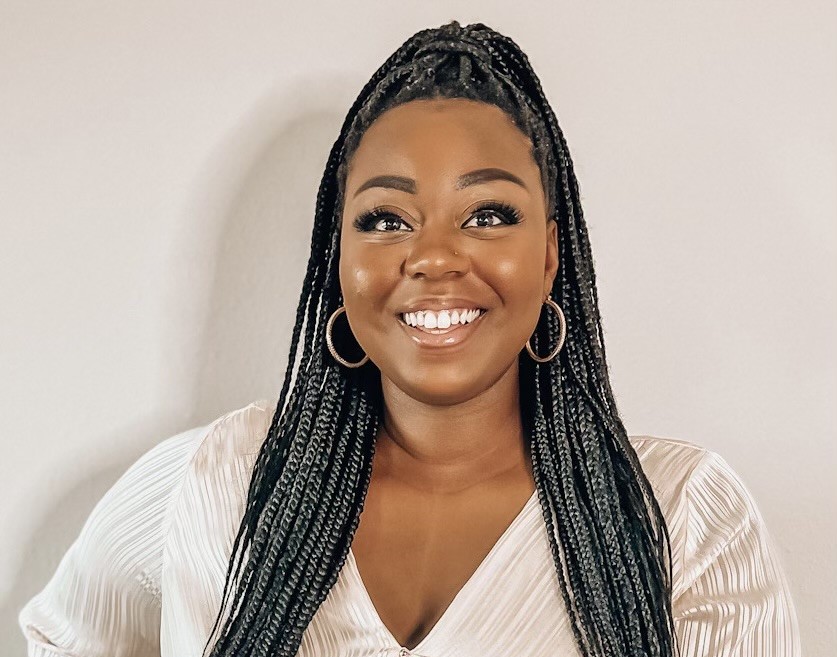
‘I had to go to counseling therapy, especially after the miscarriage, because I was having a lot of suicidal thoughts,’ Jessica Gainer revealed.
“Miscarriage is something that is not talked about a lot, especially amongst Black women. When it happened to me, I didn’t know who to talk to. I didn’t know what to expect. I didn’t know what was going on with my body,” Gainer expressed.
Not wanting to totally give up on her real estate dreams, she cut back her hours to part-time and decided to focus more on her mental health.
“I had to go to counseling therapy, especially after the miscarriage, because I was having a lot of suicidal thoughts. It was a necessity for my life and for my children’s life,” Gainer shared.
“Therapy is not just for you. For people who don’t go and know they need to go, it’s kind of selfish because when you don’t go, you don’t deal with your issues or your traumas that you have and they start projecting on your children, on your marriage, on your friendships…You have to heal yourself so that you can be better for other people, and that’s why I went.”
Gainer said cutting back on all she was trying to accomplish has helped.
“I’m living the soft life, honey. I don’t have time for this strong Black [woman] that is so dead to me…Listen…Help me. I’m not carrying groceries in the house. I’m not pumping the gas If I don’t have to,’’ she related.
“Call me what you want. Because other cultures, other women, people [who] don’t look like us, have been doing it all these years. The minute we say that’s what we want, we’re asking too much. So, I’m here to change the narrative. We’re asking for what we deserve, which is support and help,” Gainer added.
Some coping strategies
Licensed mental health counselor Antionette Pollard, a mother of three, also was a stay-at-home mom when her first child was born.

‘Therapy isn’t just for rich people. Therapy is for everybody,’ Lakeland therapist Antionette Pollard stated.
The Lakeland therapist suggests some coping strategies to deal with the change in lifestyle and loneliness that can come with caring for children, including identifying a new set of friends who have the same priorities and similar life circumstances, identifying new hobbies, and setting realistic expectations. Perhaps you won’t be able to clean the entire house, cook dinner daily, and care and breastfeed the baby throughout the day.
Pollard also mentioned it’s best to find a therapist before a crisis.
“Just like you already have doctors for other needs and form relationships with them before pregnancy, it’s good to identify a therapist before a crisis,” Pollard explained. “It’s very much like dating. You might get it right on the first time, and you might not. But it certainly is more helpful and beneficial to you to find a counselor when you’re your best self, compared to if you’re in a crisis or if things are going kind of chaotic in your life. “
Pollard said a therapist could offer a non-biased outlook on the challenges people face.
“Talking to a therapist allows you to talk to a neutral person who doesn’t have anything invested in your job performance or your relationships with your family. They can give you a different viewpoint on something you’ve been struggling with,” she related.
Pollard said stay-at-home-moms could use their spouse’s Employee Assistance Program to access free, confidential therapy sessions or access mental health counseling through their insurance plans. She said there also are college interns who are willing to provide therapy sessions for a lower rate.
“Therapy isn’t just for rich people. Therapy is for everybody,” Pollard stated.
‘In a happy place’
It was therapy that led Williams to become a stay-at-home mom in 2015.
Juggling two young children, studying for a master’s degree and working in corporate America as an international tax and dividends specialist, she said it became too much. She was working in the finance world, far from her degree and passion for dance, which was her major in college.
A fellow Black co-worker informed her that she could take a leave of absence from the job to focus on her mental health if she attended weekly therapy sessions. Williams enjoyed her time away so much that when she returned, she quit soon after.
“I literally just walked out of my job one day…Packed up my stuff and became the accidental stay-at-home mom,” Williams recalled. “It came to a point where I wasn’t happy. Trying to climb the corporate ladder as a female, as a Black female, when you’re in these total white spaces where the white males are controlling all the things, and you feel your voice isn’t being heard.”
Although she didn’t want to be a stay-at-home-mom, Williams said it was the natural thing to do while she figured out what she wanted to do with her career. Then, in 2017, she unexpectantly became pregnant with her daughter and gave birth to her in February of 2018. Six months later, she started a blog as a creative outlet. It eventually became the “Fun Foodie Mama,” where she discusses motherhood and places to eat in Tampa Bay.
The blog led her to want to return to the workforce. But then the pandemic hit, further prolonging her wish to get a job outside of the home. That’s when a friend inspired her to go after her dream of creating an arts nonprofit. She created the Mahogany Kids Fine Arts Foundation in 2021, with the goal of exposing Black children to the arts.
“I finally feel like I’m in a happy place. Being a stay-at-home mom, being a founder of a nonprofit, and being a creator of a food blog that …is helping…open doors for me to get to know people who are helping me with my nonprofit. I’m OK with being a stay-at-home mom because it gives me flexibility to be with my kids but also pursue other things while I’m doing that,” Williams said.
An ‘opt-out mother’
In some circles, Williams would be considered an “opt-out mother,” which is even rarer for Black moms.
These are typically college-educated women whose spouses work, and they opt not to work due to work-family issues. According to Pew Research Center statistics, Black women accounted for only three percent of these moms back in 2012. The status was more common in white and Asian households.
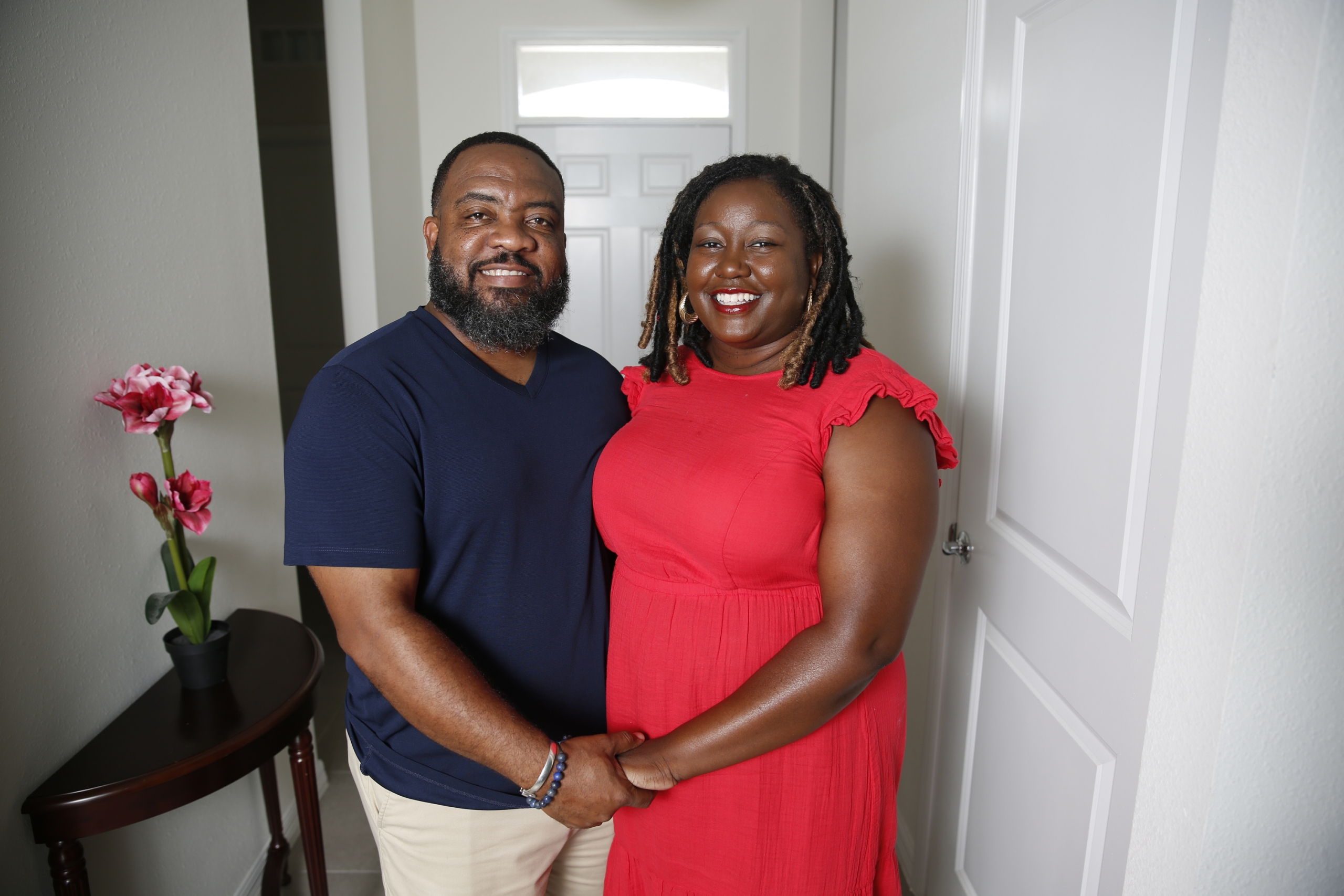
‘Trying to climb the corporate ladder as a female, as a Black female, when you’re in these total white spaces where the white males are controlling all the things, and you feel your voice isn’t being heard,’ said Kiva Williams, seen here with her husband, Nathan Williams. OCTAVIO JONES/ WUSF PUBLIC MEDIA
For Williams, it was quite the adjustment, walking away from her “good job” with benefits. She struggled mentally, trying to accept her new identity.
“I quit working at this job where I had a title…I was the corporate career girl. Deep down inside, I wasn’t happy. I became in my mind nothing,” Williams said, adding she didn’t want to be a stay-at-home mom, but this was the position she found herself in.
“I was trying to find myself because I was lost.”
In her early days of being a stay-at-home-mom, Williams said it was lonely. She found her tribe during the day at a gym where other stay-at-home moms spent time together. Again, she was the only Black woman in the group. She found striking differences between how their families saw their roles and how her family saw hers.
“I had this circle of white stay-at-home friends, and that’s what you do. Of course, you stay home with your kids. That’s a no-brainer to them. Their parents, everybody supported that,” Williams recalled. “Meanwhile, I’m a stay-at-home mom, and people are asking, ‘Are you getting a job? You can’t just be a stay-at-home mom. That’s cute for one week.”’
The comments would bother her, Williams said, because she knew the reality. She oversaw her entire household, was helping her family save money on childcare, and, essentially, running her household felt like running a business.
The experience led her to create a monthly gathering of moms, mostly Black, who meet every second Friday of the month in the Tampa Bay area to discuss the challenges and successes of motherhood and life.
Besides dealing with the complexities of being a stay-at-home mom and starting a business, Williams and Gainer said the pandemic and the killing of George Floyd in 2020 also took a toll on their mental health.
“It’s not just the parenting part or just being a mom,” Gainer explained. “It’s everything going on in the world. You got your COVID. You got your mass shootings. You got government issues. It’s just everything on top of having to be a parent. It’s a lot. It’s a lot.”
‘Give yourself some grace’
Pollard recommends discussing the issues with children in an age-appropriate manner.
“Instead of shielding them, have the age-appropriate conversations with them. Children have very active imaginations, so when we don’t have conversations with them, they make up other things in their minds about it, which could be far worse than what’s happening, or they could be minimizing the severity of the situation,” Pollard said.
The moms all agree that finding a tribe of women with similar experiences to connect with, along with giving themselves some grace, has done wonders for their mental health.
“Give yourself some grace. We are so hard on ourselves, and we are expected not just from ourselves but from others to do so much,” Pollard suggested. “If it didn’t all get done today, there’s tomorrow.”
Stephanie Claytor is a freelance writer for the Florida Courier. This story is part of a collaboration with the Florida Courier, The Weekly Challenger, RoyalTee Magazine and WUSF Public Media.
Crisis resources:
- If you are or know someone in crisis, call the National Suicide Prevention Lifeline to speak with a trained crisis counselor 24/7 at 800-273-TALK (8255).
- To connect with a trained crisis counselor and receive free 24/7 crisis support through text message, text NAMI to 741-741.
- National Domestic Violence Hotline: Call 800-799-SAFE (7233)
- National Sexual Assault Hotline: Call 800-656-HOPE (4673)
Other resources:
- If you or someone you know needs help, call the NAMI Helpline, Monday-Friday from 10-10 p.m. ET, at 1-800-950-NAMI (6264)
- For local help, call The Well for Life at 727-401-0239
- therapyforblackgirls.com
- blacktherapistsrock.com
American Psychiatric Association’s Mental Health Facts (2017) – Use of Services and Disparities
- Rates of mental illness in African Americans are similar to those in the general population. But disparities exist regarding mental health care services.
- Only one-in-three African Americans who need mental health care receive it
- African Americans are also more likely to use emergency rooms or primary care (rather than mental health specialists).
American Psychiatric Association’s Mental Health Facts – Barriers to Care
- Stigma associated with mental illness
- Lack of providers from diverse racial/ethnic backgrounds
- Lack of access to culturally competent providers
- Lack of insurance, underinsurance
- Distrust of the health care system
Black Americans face a complex set of challenges as they try to maintain their mental health. On top of universal issues like depression, stigma and economic stress, they face racism and inequities in the health care system. The Florida Courier, The Weekly Challenger, RoyalTee Magazine and WUSF Public Media created this series to highlight the stories of Black Floridians seeking emotional healing and wellness, and to provide resources for those needing support.

